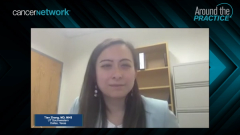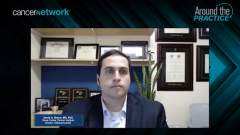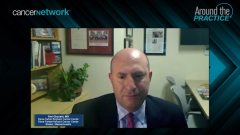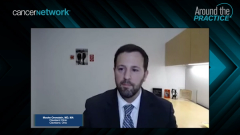
Clinical Trials of Frontline Treatment of Advanced Renal Cell Carcinoma
Tian Zhang, MD, MHS, and Moshe Orenstein, MD, MA, recall data from two clinical trials for first-line treatment of advanced renal cell carcinoma: CheckMate-9ER and CheckMate-214.
Episodes in this series

Toni Choueiri, MD: Welcome to this Cancer Network Presentation, Around the Practice: The Shifting Treatment Paradigm for Advanced Renal Cell Carcinoma. I'm your host, Dr. Toni Choueiri, Director of the Lank Center for GU Oncology at Dana-Farber Cancer Institute. And joining me today are Dr. David Braun from the Dana-Farber Cancer Institute, Dr. Moshe Orenstein from Cleveland Clinic and Dr. Tian Zhang from UT Southwestern. Would you each introduce yourselves? David, Moshe and Tian. David?
David A. Braun, MD, PhD: Absolutely. Thank you so much for hosting this and for the chance to have a wonderful discussion tonight. I'm David Braun. I'm a physician scientist who focuses on kidney cancer both in the clinic and laboratory. And I work, as Dr. Choueiri mentioned, at Dana-Farber Cancer Institute.
Toni Choueiri, MD: Dr. Orenstein?
Moshe Orenstein, MD, MA: Good evening, it's great to be here. Moshe Orenstein, I'm a GU oncologist at the Cleveland Clinic Taussig Cancer Center where I spearhead the RCC efforts. I'm delighted to be here with colleagues and with the audience.
Toni Choueiri, MD: And Dr. Zhang?
Tian Zhang, MD, MHS: Hi, everyone. Really glad to join the conversation tonight. Thank you so much for having me. I am a GU medical oncologist and just transitioned from Duke to UT Southwestern. I'm glad to be in Dallas.
Toni Choueiri, MD: So, today what are we going to is review the data presented at recent conferences and discuss current challenges in the treatment of patients with metastatic renal cell cancer. We’ll review a few patient cases and involve our audience by using an interactive platform to answer several polling questions that then we discuss by our panelists. So, let's begin. First to start off, let's quickly review risk assessment for a newly diagnosed patient with metastatic RC. So, we're going to have two segments, the first one, probably 30, 40 minutes that will deal with first like treatment of advanced RC because I can tell you that that's where most of the trial recently were published with doublets. And then we'll move in the next 20, 30 minutes to second line, to the refractory setting in advanced RCC. So, I wanted to review first the clinical trials that changed the field for advanced RCC [renal cell carcinoma]. Let's start first by Dr. Zhang. Dr. Zhang, in a minute, CheckMate-9ER, what's that about?
Tian Zhang, MD, MHS: CheckMate-9ER phase three first line trial for kidney cancer where patients were randomized to either receiving nivolumab with cabozantinib, so an immunotherapy and a targeted approach versus sunitinib which was the standard of care for a long time for our patients with metastatic kidney cancer. And we saw intention to treat population, so all comers, an improvement in progression free survival and overall survival and in the objective responses. And so, then the update to the initial presentation we saw at ASCO [American Society of Clinical Oncology] this year and looking at IMDC [International Metastatic Renal Cell Carcinoma Database Consortium] subgroups in terms of risk status, all patients benefited regardless of their favorable, intermediate, or poor risk disease groups. And we saw a benefit in most times in doubling of their progression free survival intervals, but also in improvements of overall survival. And I think what's notable of these VEGF/TKI strategies is that we are seeing almost comparable rates of complete responses. Of course, we love to shoot for complete responses and we're seeing up to about 10% complete responses in these patients, especially in an intermediate risk and favorable risk disease.
Toni Choueiri, MD: Dr. Orenstein, CheckMate-214 in a minute?
Moshe Orenstein, MD, MA: I think CheckMate-214 really revolutionized the field of kidney cancer treatment in the front line setting. It was a phase three trial that randomized patients to receive ipilimumab and nivolumab times four followed by nivolumab maintenance versus sunitinib which was the standard of care at the time. And it was the first of the IO [immunotherapy] based combinations to be approved and remains the only IO/IO combination. All the other ones you'll hear about tonight are IO/TKIs [immunotherapy/tyrosine kinase inhibitors]. Now, the primary endpoint in the initial study was in the intermediate and poor risk, which we'll get to in a little bit. And it demonstrated a superior overall survival and objective response rate compared to sunitinib. What's great about this combination and what really led to the approval in intermediate and poor risk patients is that these results seem to stand up over the test of time, both in the 25 month follow up, which was the initial presentation, the 42 months follow, the most recent five year follow which I'll just give ten seconds on. It's really demonstrated that we finally have for the ITT for all comers, we have a median overall survival of 55.7 months which is wild when you think about where the field was just a couple of years ago. And to think that approximately 30% of patients are still progression free at around five years. So, it's remarkable to see this combination hold up over the course of time and be the only IO/IO combination as a standard of care in the front line setting for treatment naive RCC.
Toni Choueiri, MD: Perfect, well summed.
This transcript has been edited for clarity.
Newsletter
Stay up to date on recent advances in the multidisciplinary approach to cancer.







































